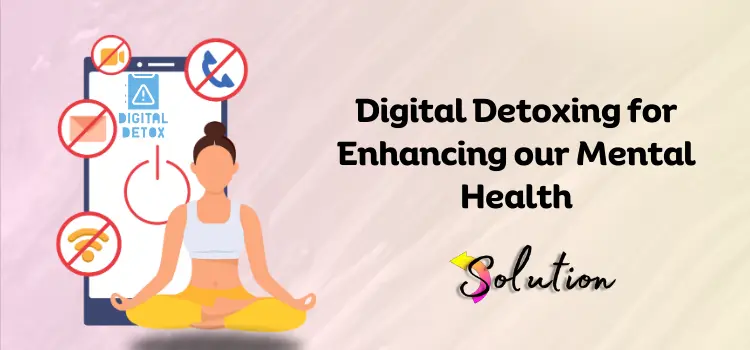
How often does it feel like there’s an overwhelming amount of social media updates, emails, and notifications? In today’s hyper-connected world, our digital habits can sometimes take a toll on our mental well-being. That’s where the idea of a digital detox comes in—it’s a chance to take a break from all the digital distractions and focus on your mental health.
Taking a break from screens doesn’t have to feel overwhelming. You can start by scheduling some time away from your devices each day or by planning a weekend filled with activities that don’t involve technology. By doing this, you’ll have more time for face-to-face interactions, pursuing hobbies, and taking the time to reflect on yourself, which can help you achieve a more well-rounded and satisfying life.
If you’re interested in finding ways to improve your mental well-being and reduce screen time, continue reading the blog below for tips on how to successfully implement a digital detox. Discover how taking breaks from technology can lead to increased relaxation and overall peace of mind.
What Does the Term Digital Detox Mean?
Taking a digital detox means taking a break from our phones, computers, and social media for a while. It’s not about getting rid of technology altogether, but finding a better balance between our online and offline lives. This break can help us clear our minds, concentrate better, and feel more energized.
Taking a break from technology can also lead to increased productivity and creativity, as well as improved overall mood and focus. Disconnecting from screens allows us to engage in more meaningful face-to-face interactions and enjoy the world around us without distractions. Furthermore, disconnecting from social media allows individuals to focus on their own personal growth and well-being without distractions. Taking time away from screens can also improve mental health by reducing the stress and anxiety associated with constant online engagement.
What are the Drawbacks of Excessive Screen Time?
Growing up in today’s world means being surrounded by digital devices like smartphones, tablets, and computers. These devices offer entertainment and connection, but too much screen time can have negative effects on our health and well-being. Check out the list below to see the potential side effects of excessive screen time and how it may impact you or your loved ones.
- This can result in mental health problems like anxiety, low self-worth, and depression.
- Fear of missing out means you lose the ability to take advantage of excellent opportunities.
- Lack of sleep leads to a feeling of exhaustion and drowsiness throughout the day.
- Imperfect self-image and body-image issues.
- It also leads to weight problems and mood swing issues.
- The attention span and academic performance are limited.
- There is little or no time for learning other ways to relax and have fun.
- Excessive screen time also increases cyberbullying and online harassment.
Also Read:- How Music Transforms Mental Health
How to Start Digital Detox Practice?
To begin digital detoxing, it’s best to start with small changes in your routine. Trying to do too much at once can be overwhelming, so take it slow, and you’ll eventually see positive changes in your daily life.
- Set the self boundaries: Choose a time during your day when you can disconnect from your devices, like during meals or the first hour after waking up. These short breaks from technology can help you begin and end your day with more mindfulness.
- Work on your hobbies: Discover what you enjoy doing, whether it’s reading a book, painting a picture, cooking a delicious meal, taking a drive, or tending to your garden. Engaging in activities that bring you joy and relaxation can help boost your mood and give you a sense of fulfillment. Pursuing hobbies that you love can be a wonderful way to unwind and find happiness in your daily life.
- Create technology-free zones: Designate specific rooms in your home as technology-free zones, such as the bedroom or dining room. These spaces can serve as peaceful retreats where you can fully disconnect and destress from the digital world.
- Plan days of digital detox: Plan designated times for your family to unplug from technology together, whether it’s during the week or on weekends. Use this time to do group activities and connect with each other, such as playing games, cooking together, going for a hike, or simply enjoying each other’s company without screens. These shared experiences can help strengthen your relationships and create lasting memories.
- Keep a journal of your experiences: Share your experiences with your diary! Reflect on how you felt before, during, and after your detox. Pay attention to any shifts in your emotions, concentration, or connections with others. Keeping a journal of your feelings can provide valuable insights into the impact of your screen time on your overall well-being.
- Discover the beauty of nature: Escape from the constant digital stimulation by immersing yourself in nature through activities like hiking, gardening, or taking a leisurely stroll in the park. Not only will this help reduce stress and improve your mood, but it can also lead to better-quality sleep.
- Challenge yourself to try something new: Looking to boost your skills during your downtime? Why not step out of your comfort zone and try something you’ve never done before? Remember, a digital detox isn’t about cutting off technology completely; it’s about finding a healthy balance and taking back control of your time and focus. Discover the benefits of trying new things and stepping away from screens. You may be surprised at how much more calm, focused, and creative you can become by immersing yourself in the real world.
What are the Benefits of Digital Detox?
Taking a break from technology can bring many benefits to your overall well-being. Not only will it give your brain a much-needed break and boost productivity, but it can also improve your sleep and strengthen your relationships with others.
- Improve Physical Health: Spending too much time in front of screens can cause health problems like obesity, eye strain, and heart issues. To stay healthy, try cutting back on screen time and getting active with activities like walking, playing sports, or working out. Engage in these activities to improve your physical health. Limiting screen time can also help reduce symptoms of digital eye strain like headaches, dry eyes, and blurred vision. Your body and eyes will thank you!
- Improves Interpersonal Relationships: Although digital interactions are convenient, they can never fully replace the meaningful connections made through face-to-face communication. By reducing screen time, you can prioritize building and strengthening relationships in person. Having face-to-face conversations without distractions like phones or computers can help us feel closer to our loved ones and build deeper relationships. It’s important to set aside time for quality interactions to truly connect with those around us.
- Upgrade Sleep Quality: Looking at screens with blue light before bed can disrupt our sleep. Try to reduce screen time before going to sleep for a better night’s rest and to feel more energized in the morning.
- Improve Mental Health: Taking a break from screens gives your brain a break from all the information overload, which can help reduce feelings of anxiety and depression. According to research, spending too much time on social media can increase feelings of loneliness and depression, but unplugging can help mitigate these bad impacts by lessening the need to continually compare oneself to others.
- Brush up productivity and focus: You can remove these distractions and create a focused environment for getting work done efficiently by disconnecting from social media. This will help you stay productive and concentrated on your tasks without interruptions. This will help you get things done faster and feel more satisfied with your work, whether it’s at home or in your job. It can make you feel more productive and successful in all areas of your life.
- Decrease the level of Anxiety: Take a break from the constant flow of news and notifications by engaging in a digital detox. By unplugging from technology, you can give your mind a chance to unwind and reduce feelings of anxiety. Finding relief from constant alerts and information overload can help reduce feelings of anxiety, allowing you to feel more calm and clear-headed. This can improve your overall mental well-being and help you focus on what truly matters.
End of Walkthrough!
In conclusion, taking a break from technology can have a positive impact on your mental well-being. By disconnecting from screens, you can make room for meaningful relationships, self-discovery, and a sense of calm. Remember, it’s all about finding a healthy balance with technology to experience greater clarity, less stress, and enhanced concentration. Take an hour off screens daily to see how it improves your health. Check out our other blog posts on wellness and personal growth for more tips and support on your mental health journey.


